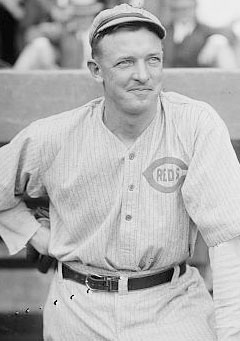
The Reds as the opponent of that fateful series, where members of the White Sox, led by Eddie Cicotte, Buck Weaver, Lefty Williams and Joe Jackson, took money to lose the World Series intentionally. The White Sox were so heavily favored, one who bet on the Reds would make a fortune if the Reds won. On this date in baseball history, Lee Magee was given his unconditional release from the Chicago Cubs amid suspicion that he was involved with gamblers and may have taken money to lose games during the 1919 season. Magee would then sue the Cubs to recover his lost salary for the 1920 season. Foolishly, he would confess that he conspired to thrown a game while playing for the Cincinnati Reds just ten days earlier. His intention was to admit what he did as a sign of honesty, which would convince NL President John Heydler and Cubs owner William Veeck he did not bet while playing for the Cubs. Of course, his admission forced the forfeiture of his contract with the Cubs and he was later banned for life for what he admitted to.
He was involved with Hal Chase, in my opinion, an even worse man that Magee was. Magee and Chase had each put up a check of $500, before game one of a double header with the Boston Braves in 1918. That payment entitled the two of them to one third of the gamblers winnings as long as the Reds lost the game. During the game, Magee did his part, making two critical errors and another on the base paths. The Reds ended up winning the game, with Magee forced to score the winning run. Magee stopped payment on his check, thinking Chase double-crossed him. Magee was dishonest with the game of baseball, his teammates and Chase which made him few allies when he had to address the charges. Magee was always a shady character, playing for five teams in his last five seasons and seven in his nine year career. After the Reds traded him after the 1918 season to Brooklyn, during a road trip in Boston (the same place the ill fated game was played), he was served with papers for non-payment of his debt to the gambler. This forced the trade to the Cubs, who instantly wanted nothing to do with the gambling allegations and Magee's baggage.
If Magee's actions seemed devious, Chase was the poster child for illegal betting on baseball. Chase was accused as far back as 1910 of throwing games for the New York Highlanders. Christy Mathewson, his manager in 1917, accused him of throwing games and suspended him. In addition to the incident in 1918, he was suspended by the New York Giants for throwing games in 1919. While he was in the process of being banned from professional baseball for life, he was kicked out of the Pacific Coast League for trying to bride an umpire. In addition, he was alleged to have won $40,000 betting on the Reds to win the 1919 WS.
There is no question that gambling was a big part of the game in the first 20 years of the 20th century in major league baseball. Many games were thrown as gamblers had the advantage of paying the players more money than they would be paid by their respective employers. The whole Black Sox scandal stems from the treatment by owner Charlie Comiskey, and though it was wrong, this was an example of non criminal players being pushed to commit the so called crime. Pete Rose is the all time hit king, with no proof or insinuation that he gambled on baseball while he was a player. However, his choice to gamble on baseball games when he was a manager led to his being banned for life. While the Black Sox or Rose could be considered bad people for what they did, labeling them as criminals, in my opinion, would be a stretch. Magee and Chase were criminals who just happened to play baseball. Hopefully the difference is noted.
I will leave on this one note: Rose broke the all time hits record held by Ty Cobb, who was forced to resign during the 1926 season when there was a report he conspired with Cleveland Indians manager Tris Speaker to determine the outcome of a game. The lack of evidence should not clear Cobb or Speaker as accuser Dutch Leonard produced two documents from pitcher Joe Wood to substantiate his claims. Commissioner Kenishaw Landis dismissed the case after Leonard refused to testify.

 RSS Feed
RSS Feed
